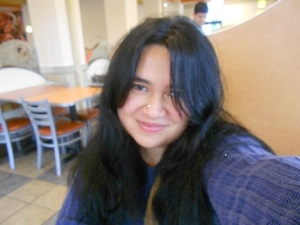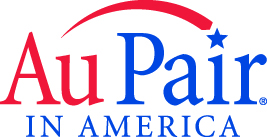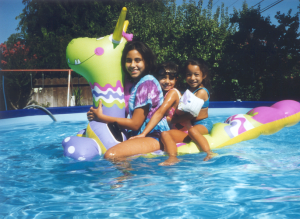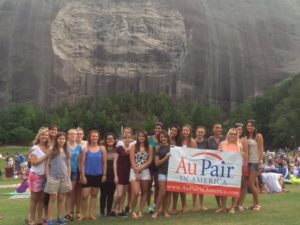American Studies Online
American Studies Online is a 19-week online course offered by
UCLA Extension that is part self-paced, part instructor-led. The
course is offered through a customized, media-rich computerbased
classroom that participants will access to read lessons,
write, share resources, network with one another and collaborate
on special projects- all designed to further their understanding of
U.S. culture. Topics include U.S. history, arts in the U.S., U.S. literature,
career counseling, and optional English language exercises.
Participants who successfully complete the program receive 6
academic units and earn a certificate of completion from UCLA
Extension. Participants also will have access to a UCLA Extension
transcript if they would like to apply their coursework to a degree
program at another college or university.
Community Involvement
The community involvement component of APIA Advantage is
comprised of Global Awareness, volunteering, and cultural and
historical activities. Au pairs will relate these experiences to their
academic coursework in American Studies Online. The community
involvement requirements must be complete by the end of the 19-
week online course.
Global Awareness
Global Awareness is a program designed to bring multi-cultural
understanding and appreciation to pre-school, elementary and
middle school children. Global Awareness enables au pairs to
visit children in different settings in their community to share
their culture, customs and language. As part of APIA Advantage,
a minimum of one Global
Awareness presentation is
required.
Volunteering
Volunteering is a great way for au pairs to connect with Americans
in the communities where they live and gain valuable experience
for the future. When choosing volunteer opportunities,
au pairs should take into consideration what will fit with their
schedule. Some may choose to participate in one long-term volunteer
opportunity while others might choose various short-term
opportunities.
Au pairs can volunteer at any location that is of interest to them.
Some possibilities are soup kitchens, libraries, nursing homes,
food banks, religious organizations, hospitals, fairs, recreation
centers and museums.
Historical and Cultural Activities
An essential part of gaining knowledge and appreciation for
America is learning about its history and culture, making it an
important component of APIA Advantage. Au pairs can visit historical
sites in their local area or while traveling in the U.S. These
might be museums, monuments, battlefields, national parks, etc.
Additionally, au pairs must take part in activities related to American
culture. There are many great cultural activities for au pairs to
experience either on their own, with friends or their host families.
Examples include attending a baseball game, trying traditional
American foods, learning an American style of dance and taking
part in holiday traditions.
How to Enroll:
Visit https://www.uclaextension.edu/education/k-12-california-teacher-credentialing-authorizations/course/american-studies-educ-x-470
An Educational Partnership with UCLA
APIA Advantage: An Educational Partnership with UCLA
is exclusive to Au Pair in America.
1 High Ridge Park H Stamford, CT 06905
www.AuPairinAmerica.com
APIA Advantage
UCLA Extension
APIA Advantage includes American Studies Online, an academic program offered by UCLA Extension,
as well as a community involvement component developed and monitored by Au Pair in America.
Category Archives: Uncategorized
Weekend Course Offered By Cultural Highways
Learning Expresscourses are offered by the Borough of Manhattan Community College (BMCC) and allow au pairs to travel to amazing American cities and share in a learning experience that’s both fun and informative. Learning Express courses are a perfect solution for au pairs with busy schedules since they allow them to fulfill their educational requirement in one weekend!
To view the upcoming schedule of Learning Express courses, please click on the link below.
Au Pairs – Upcoming WEEKEND Courses in Great Locations!https://www.campusce.net/learningacrossamerica/course/course.aspx?catId=80
|
Top 10 Tips – Au Pair Guide to a Successful Working Vacation With Your Host Family.
Top 10 Tips – Au Pair Guide to a Successful Working Vacation with your Host Family
Prepared by Joan Barth, Orientation Leader, APIA
Traveling with your host family can be a wonderful adventure and significant part of your
cultural exchange experience. When it is a ‘working vacation’ (you do not have a choice about
participating) there are some things that you and your family can do to help the vacation go
smoothly for all.
10. Vacation Stages: Think about a working vacation as a three-part experience and that you
have a role in each stage. The parts are: Pre-Vacation Preparation, The Vacation, and Re-Entry.
Going on vacation is great, but there’s a lot of work on either end. You are part of the vacation
team.
9. Pre-Vacation: Think about how you can help the host parents, how you can prepare the kids
and how you can prepare yourself.
8. Helping the parents: Can you pack for the children? Can you prepare snacks? Can you
entertain the children while the host parents pack? Can you do some errands for the parents?
7. Preparing the children: It’s more than packing. Can you be an educator and get books or go
online to research the area you will visit? Can you help the children to organize/collect their
media and entertainment for the trip? How about making a busy bag for smaller children?
Involve the children in deciding on and preparing snacks for the trip.
6. Preparing yourself: Ask your host parents for information about the trip. You will feel
better if you know the details. Those details might include: the exact dates of the trip, location
and contact information, will any other friends or family members be joining, is special clothing
or equipment needed? More questions: are there any special events (anniversary celebrations,
reunions), what about the work schedule, how can I plan for my free time? Take care of
business: International Travel? Check on visa and DS2019 requirements. Notify your counselor
of your travel plans and ask your counselor to connect you with a counselor in the area you will
visit so that you can meet other au pairs. Research the area so that you can fully enjoy your free
time.
5. Good to know: Program rules for hours, free days, and pay are the same when you are on a
working vacation. However, it’s also important to recognize that a change in location and
schedules may require some flexibility on everyone’s part.
4. General Safety Issues: Everything is different when you are en route to your vacation
destination and at the destination. Therefore, everyone (host parents and au pairs) need to be
very clear about who is responsible for each child AT ALL TIMES. Do not make any
assumptions about this. Be sure to have a very clear discussion and system for assigning
responsibility at all times. Have a safety plan for amusement parks and other activities. If
everyone is in charge, then no one is in charge – and that’s when problems occur. When you
arrive at your destination be sure to conduct a safety review of the hotel room or cottage with
your host parents. That might include checking that doors, windows and electrical outlets are
safe for your little ones.
3. Water safety: You must always be with your child. Be certain that you, your host parents
and your older children have a clear understanding of water rules and expectations for them, too.
Don’t forget sunscreen for your kids and that it needs to be reapplied. And, of course, don’t
forget sunscreen for yourself!
2. Travel safety for you: Please remember that this is a new location for you, too, and it’s
important to follow basic safety rules. Ask your host parents for advice about areas you might
visit and how to safely get to them. What’s the best/safest transport? Let people know where you
are going – we care about you. A stranger is a stranger, even in an exotic location.
1. Re-Entry: Travel is fun and it’s exhausting for everyone – please remember to offer help
unloading the car, unpacking, putting in some laundry or keeping the children entertained while
your host parents attend to these tasks. And, of course, saying thank you goes a long way.
Vacation Information For Au Pairs
Vacation Information For Au Pairs
Vacation Information For Au Pairs
Planning a holiday while you are enjoying time in the USA as an Au Pair is exciting. There are a few things to keep in mind to allow your travel to happen smoothly.
Begin to think about your holiday as soon as you have settled in with your family. Every Au pair has 11 days of holiday, unless you were in rematch. An Au pair in her second family will have her vacation pro-rated between the two families. If she did not take any vacation with her first family, she will be paid for those earned days. The total 11 days will be lessened by this amount for the second family. It is usually best to take two smaller vacations instead of one long vacation. You can think of one holiday per every six months. You will plan to back up your five days off with your weekend off, giving you a longer holiday.
soon as you have settled in with your family. Every Au pair has 11 days of holiday, unless you were in rematch. An Au pair in her second family will have her vacation pro-rated between the two families. If she did not take any vacation with her first family, she will be paid for those earned days. The total 11 days will be lessened by this amount for the second family. It is usually best to take two smaller vacations instead of one long vacation. You can think of one holiday per every six months. You will plan to back up your five days off with your weekend off, giving you a longer holiday.
Start talking with other Au pairs about their travel plans. A group trip can be a great way to travel and save money. Trek America, and Cultural Highway have wonderful pre-planned trips. You can also find great deals through the internet, especially on cruise lines. Try www. vacationstogo.com. As soon as you have an idea, you will want to talk it over with your host family. They will need time to arrange for alternate childcare or to arrange their vacation at the same time. It might not be possible for the family to accommodate a certain date. Often, a family will know in advance when they want you to take your vacation. This works well, if everyone knows in advance, at least three months.
There are special papers and in some cases visas that will be needed, if you plan to travel outside the United States. These can take up to four weeks, so plan ahead. Refer to the Au Pair In America website for more details about travel outside the USA. There is even a link to your country’s consulate if you have special questions. Canada and Mexico travel is discussed on the web site. You will also need to get your DS-2019 form signed by Au Pair In America for travel outside the USA. You can learn how to go about this on the web site. When mailing your DS-2019 form to Au Pair in America, you need to use UPS or Fed Ex. These mailing services can track a letter and find where it is, in case it gets lost. If you send it regular mail, you cannot “find” it if it gets lost. An Au Pair in the thirteenth month or in an extension term cannot travel outside the USA. For more information see https://www.aupairinamerica.com/resources/travel_and_flights/travel_visa.asp
It is not necessary to return home to renew your visa to extend your program year. You will be granted a new DS2019 form by the State Department, giving legal status to stay within the USA for up t0 12 months. Au Pairs are advised against saving up your vacation days to renew a visa. Many times the new visa is denied. The Au pair is not allowed to re-enter to finish the program when this happens. https://www.aupairinamerica.com/resources/travel_and_flights/travel_visa.asp
Sometimes vacationing can be confusing. If you go on your host family’s vacation with them, it is not your vacation. It should be thought of as a regular work week with a schedule. All travel and hotel expenses should be paid for by the family. If you have time off during the vacation, your personal expenses are your responsibility. Taking a separate vacation from your family is an important break for you. This allows everyone to benefit. A little fun time away should leave you refreshed and once again ready to give your best to the children in your charge.
Do you have the desire to teach English?
If you have the desire to teach English to speakers of other languages, enhance your career with Global TESOL Certificate program

The Global TESOL (Teaching English to Speakers of Other Languages) Certificate is a training program designed for individuals who want to teach English in a non-public school setting within or outside of the United States. Unlike basic TESOL courses available online, this is an in-depth program that includes observing TESOL classrooms and practicing with other students.
The course modules in this classroom program will give you a solid theoretical foundation for teaching English, as well as hands-on classroom experience and job-searching skills. You will learn about intercultural communication, linguistics, and curriculum and lesson plan development. Successful completion of the program will prepare you to work as a teacher, trainer, tutor or cross-cultural communicator both at home and abroad.
Many au pairs have used the TESOL certificate to enhance their future careers or to begin a career once returning home. 
Learn more about TESOL by going to the continuing education menu of the college or university closest to your host family.
Kennesaw College has a classroom format that is taught on 16 Saturdays from 9am to 4pm
https://kennesaw.augusoft.net/index.cfm?method=course.classinformation&coursenumber=QLAN3102
This is what au pair Danni has said about her experience earning her TESOL Certificate:

“I have been taking the TESOL course from the UGA university since last November and it has been wonderful for me. I think the program encourages students to think about practical application of learning not just about understanding of course materials by doing case studies or analysis on target subjects. Throughout the program the assignments involve both individual and group study so that it prepares the students not only work alone but also work together. I also appreciate the fact that the program teaches technical aspects of teaching English as a second language but also ethical aspects which cannot be ignored. The program is well organized with all requirements made clear from the start and it is evident that a great deal of thought and energy are put into the instruction of each course. I really recommend this course to all girls that wish to have more knowledge in the teaching field.
Besides, the professors within the TESOL program are extremely knowledgeable professionals within the field who offer students a well-rounded education through their various areas of interest. Currently, I am taking my last module on Saturdays and I have found the TESOL course to be both informative and fun. This course gives you all the tools needed to become an effective teacher plus you’ll have a lot of fun at the same time.”
Danni T. fromBrazil
Au pair In America
Why is the Food For New Year’s Day Special?
Shared from the East Cobb, GA Patch
Georgia’s New Year’s Meal: Pork, Greens And Black-Eyed Peas
Here’s why we eat what we do on New Year’s Day — plus a greens recipe from Chef Kevin Gillespie’s restaurant, Revival.
ATLANTA, GA — On New Year’s Day in Georgia, there’s little question what will be on many folks’ dinner tables.
In Italy, they’ll eat lentils. Japanese kitchens will be serving up Soba noodles and folks of Scandinavian origin will be wolfing down pickled herring. But, in the American South, it’s pork, greens, corn bread and black-eyed peas that will be filling the bellies of hungry New Year’s revelers.
But how did we come by this specific meal? Well, separating fact from fiction when tracking down traditions can be tricky business. But here’s a look at what we know about the Southern New Year’s meal.
Pork
In the South, we are not alone in making pork a New Year’s staple. Folks all over the country, with ancestors from all over the world, make some variation of this dish.
Why? Many believe it’s because pigs root forward — toward the future — unlike, say, a chicken, which scratches backward, toward the past.
“And sauerkraut with pork was eaten for good luck on New Year’s Day, because, as the (Pennsylvania) Dutch say, ‘the pig roots forward’,” wrote historian William Woys Weaver wrote in “Sauerkraut Yankees,” a Pennsylvania Dutch cookbook with recipes dating back to 1848.
There may be a seasonal reason for this tradition, too. Throughout history, pigs would have been butchered in the fall, when the weather was cooler, meaning there would be plenty of fresh cuts come the new year.
Black-Eyed Peas
According to one popular story, black-eyed peas became a symbol of luck in the South during the Civil War. According to this legend, during Union Gen. William T. Sherman’s march toward Savannah, his troops confiscated all the food they could find, but ignored black-eyed peas because they were considered animal feed.
That made them one of the only edible foods left behind and, therefore, a “lucky” food.
Some historians, though, question that story. The peas originated in West Africa and were introduced in the Southern United states around the 17th Century, so the association could have African roots. Hoppin’ John, the combination of seasoned black-eyed peas and rice, almost certainly has its roots in that region.
And, another theory suggests the tradition sprung from early Southern Jewish communities because of the peas’ similarity to a food mentioned as a New Year’s meal in the Talmud.
Greens
We’re usually talking collard greens here, although mustards or turnips will do. But, greens are a Southern New Year’s staple, for sure.
Pretty much everybody at least agrees on what this one means — green means money and eating greens at the beginning of the year means you’ll have a prosperous 365 days ahead.
“Some folks consider the black-eyed peas to represent coins and the greens to represent folding money, a la cash, while others simply consider it general good luck to eat them,” Dan Gillotte, chief Executive Grocer at Austin, Texas’s Wheatsville Food Co-Op, said to Mic.com.
Cornbread
Cornbread has the least documented origin story among the New Year’s Day meal selection. The general consensus is that the golden carb represents real gold — another omen for financial success in the coming year.
We suspect it might actually just be that cornbread is delicious with greens, black-eyed peas and pork. And that’s just fine by us.
If all this has got you hankering to make your own New Year’s meal, Revival— chef Kevin Gillespie’s Southern-style restaurant in Decatur — was kind enough to share their recipe for smokped greens with Patch. Let us know if you whip up a batch!
Revival’s Hickory-Smoked Local Greens
- 1 qt. double chicken stock
- 1 large sweet onion (baseball sized)
- 1 head garlic, peeled
- 1 big pinch dried red pepper flakes
- 1 big pinch salt
- 1 big pinch ground black pepper
- 1 lb. butter, cut into small chunks
- 2 Tbsp. apple cider vinegar
- 3 bunches greens (collards, black kale, Siberian kale, mustard greens, turnip greens)
- Bring stock to just under a boil in a large pot over medium-high heat. Peel and slice onion very thin (use a mandolin if available). Add onion, garlic, red pepper flakes, salt and black pepper to stock. Using an immersion blender, add butter one piece at a time. This will emulsify and look creamy. Add vinegar. Taste and adjust seasoning as needed. It should seem aggressively seasoned. Pour liquid into a semi-shallow heat-proof dish (preferably metal).
- Separately, blanch and shock the greens of your choice (a blend is great). Squeeze out excess water.
- Add the greens to the liquid, really packing them in as they get smaller. The liquid should just barely cover the greens.
- Put the dish above a wood-burning grill. The grill should stay around 180 degrees. Cook for 6 hours, stirring periodically to be sure the greens on the bottom get stirred up to the top. Cool greens in the liquid overnight (Do not skip this step!). Warm up the greens and liquid serve.
Stone Mountain Laser Show Host family and Au Pair event 2016
Deadline to request an extension for a second term with Au Pair In America
IMPORTANT EXTENSION TIMELINE INFORMATION
The timeline below indicates when application materials need to be received in the Stamford office. Failure to submit paperwork before these deadlines may result in a denied extension.
Current Contract End Date |
Deadline for filing an extension |
| 1/5/17
|
10/26/16 |
| 1/10/17 | 10/26/16 |
| 1/24/17 | 10/26/16 |
| 2/7/17 | 11/16/16 |
| 2/21/17 | 11/16/16 |
| 3/6/17 | 1/11/17 |
| 3/20/17 | 1/11/17 |
| 4/3/17 | 1/25/17 |
| 4/17/17 | 1/25/17 |
| 5/1/17 | 2/22/17 |
| 5/15/17 | 2/22/17 |
| 5/22/17 | 2/22/17 |
| 6/12/17 | 3/22/17 |
| 6/26/17 | 3/22/17 |
| 7/10/17 | 4/19/17 |
| 7/17/17 | 4/19/17 |
| 7/25/17 | 4/19/17 |
| 7/31/17 | 5/17/17
|
| 8/7/17 | 5/17/17 |
| 8/14/17 | 5/17/17 |
| 8/21/17 | 5/17/17 |
| 8/28/17 | 5/17/17 |
| 9/5/17 | 6/14/17 |
| 9/11/17 | 6/14/17 |
| 9/18/17 | 6/14/17 |
| 10/9/17 | 7/19/17 |
| 10/23/17 | 7/19/17 |
| 11/6/17 | 8/16/17 |
| 11/13/17 | 8/16/17 |
| 11/28/17 | 8/16/17 |
| 12/11/17 | 9/13/17 |
| 12/26/17 | 9/13/17 |
Tips for Travel Outside the USA with your Au Pair.
Please take a second to respond to this email. This email will count as our monthly communication, if you respond. As always, I am happy to assist you. If you would like a call, please let me know.
- The consulates and additional info for travel to Mexico and Canada can be found on the APIA website.
- http://www.aupairinamerica.com/resources/travel_and_flights/travel_outside_us.asp
- If you are planning to travel with your Au Pair or you know that your Au Pair is traveling on her own, please email your Community Counselor with your travel dates, She can provide a travel letter which can be helpful.
- Au pair’s documents should be held in the hotel safe or other safe place. If lost, the Au Pair would have to return home to her country and obtain replacement documents before she could re-enter the USA.
Weekend Study Classes for Au Pairs.
2017 Weekend classes
*Au Pairs are allowed one weekend course for half their requirement.
*If the class is remote, Host Families pay for the class and what is included. Au Pairs pay for transportation, food, & lodging.
Albany, NY College of St. Rose, at Silver Bay- http://silverbayaupaircourse.com/
AP chooses subjects. Please see course descriptions.
Lodging and meals are included in the average cost of $285. Each weekend plus homework, provides an au pair with 3 credits.
Brookville, NY Long Island University http://liu.edu/aupair
Weekend classes focusing on one topic. They offer transport from the train station at a certain times. Please see course descriptions. Average class cost of $250 and is based on receiving up to 3 credits. Lodging and meals are not included but can be purchased for $100.
White Plains, NY Pace University www.pace.edu/eli/westchester/j-1-au-pair-student
No housing, but free parking.
3 course offerings – American Studies through Film, Cross Cultural Communication, American Humor, Tourism. 20 credit hour class: 9-5 pm Sat & Sun for $200. 40 hour credit class: weekend class & research essay requirement for $365.
Purchase, NY SUNY Purchase www.purchase.edu/ell
Explorations in American Life and Language – courses focused on English language in business and culture classes. Weekend options: 20 hours or 40 hours towards your U.S. government education requirement. No housing available, but short term parking available.
New Rochelle, NY Iona College http://www.iona.edu/Student-Life/Student-Experience-Activities/International-Student-Services/ESL-General-Au-Pair-Program.aspx
2 class offerings –American Pop culture and The Real You-Fulfilling Your Dreams. Each class has a 2 or 3 credit option depending on completing a multipage assignment. 2 credit class costs $225, 3 credit course costs $350. Lunch served both days, class runs from 9am – 5:45pm each day. No housing available.
New Brunswick, NJ Rutger’s University http://www.cpe.rutgers.edu/aupair/
Classes tailored to Au Pairs. Topics include American Food, Childcare topics etc. 8:30-4:30 on Saturday & Sunday. $390 for 3 CEUs, includes materials, breakfast, and lunch. Certificate upon completion. No housing but onsite parking, free shuttle from NJ transit train station. See website for full details.
Boston, MA Bunker Hill Community College http://www.bhcc.mass.edu/ce/aupairweekendprogram/
Please see course descriptions. Classes provided by National Louis University. Average cost of $345 is based on up to 4 credits, combination courses are available for up to $585. No lodging available, but website refers to local hotels. Three meals are included in the cost of each session
Cultural HiWays/ Borough of Manhattan Community College (BMCC).
Courses for education and travel experience as part of the class.
http://www.bmcc.cuny.edu/ce/page.jsp?pid=1103&n=Learning%20Across%20America
Courses earn 4 CEU’s or 40 hours. Niagara Falls ($519), Washington DC ($489), San Francisco ($599). Tuition typically includes transport to airport, housing and breakfasts.
http://www.chiways.net/Educational_Courses.html – CT, NJ, PA, IL, NY, DC for 45 hours.
Massachusetts Bay Community College / East Coast Adventures http://eastcoastedventures.com/
“Journey through North America” class – class room learning and trip for 3 CEUs.
Montreal, Niagara Falls, Philadelphia, Quebec City & Washington DC. APs responsible for visa/ passport requirements for any travel to Canada. See site for dates & pricing.
Washington, DC Virginia International University http://viu.edu/sels/programs/adult-esl.html#Museum
One day classes at Smithsonian Museums and private are galleries. Classes typically run 10:30am – 3:30 pm. The museum classes are $40/class, and students earn 0.5 CEUs. For new students, there is a one-time administration fee of $20. There is no textbook. See website for details.
Washington, DC continued on next page.
Washington, DC University of the Virgin Islands www.uviprogram.org
http://reg.abcsignup.com/reg/event_page.aspx?ek=0040-0016-856f3de29a2043ed8c7ded072bb2faf7
American History classes, Exploring DC with a walking tours, Sign Language, Personal/ Career Development, Movie making, Understanding politics etc. Saturday & Sunday for 20 hours/ 2 CEUs for $275. Class occurs at the Smithsonian Museums. See website for details. Additional classes in Maryland.
Washington, DC George Washington University https://wbl2016.wordpress.com/
Women’s Business Leadership. Focused on leadership, mentorship, professional communication, & goals. Pre and post class assignments. 36 hours towards requirement. $360 early registration price / $375 late registration price + $25 materials fee.
Arnold, MD Anne Arundel Community College http://www.aacc.edu/
“Preventing the Back Home Blues”. Re-integrating au pairs back into their home country and discussing reverse cultural shock and how best to handle emotions using various techniques.
6 hour class on Saturday / 0.6 CEUs earned, $104 and includes lunch.
Richmond, VA University of Richmond
Under Language and Culture Studies: http://spcs.richmond.edu/noncredit/language-culture/index.html and Under Cultural Studies: http://spcs.richmond.edu/noncredit/language-culture/culture.html
Under humanities-culture: http://spcs.richmond.edu/noncredit/areas/humanities-culture/cultural-enrichment.html
Please see course descriptions. The average cost of $325 is based on 3 credits. Less expensive, shorter one day opportunities are available for less credits. No lodging available but, website references to local hotels at a special rate.
Chapel Hill, NC University of North Carolina at Chapel Hill www.humanities.unc.edu
“Adventures in Ideas: Weekend Seminars” Lectures and optional meal. Several offerings focusing on Global Urban Life, American Christianity, African American Music, Mapping the Ancient World etc. See website for more details. Tuition by deadline $110 – $125, late registration $125 – $140. Meals $15-20. Discounts for multiple registrations. No housing or transportation available.
Charleston, SC Trident Technical College
http://www.tridenttech.edu/ce/programs/catalog/charleston-history-and-culture.htm
Southern culture, history, language, landmarks. Learning takes place in and out of the classroom. Includes graveyards (ghost stories). Late Friday – Sunday. 30 hours, for $325. Registration includes fees for events, but not food or lodging. Hostel information available on site.
Tampa, FL Hillsborough Community College www.hccfl.edu
American Dreams classes – You and Your community and USA and Tampa in a Nutshell. 40 hours each. $295 Tuition + $50 materials fee. Late registration penalty is $50. Housing is not included in price of tuition, but can be arranged as a convenience. Housing cost depends on length of stay and accommodations chosen. See site for details.
Chicago, IL Roosevelt University http://www.roosevelt.edu/aupair
Receive up to 45 hours for a 3-day weekend class for $295 + $50 food, materials and activity fee & $10 registration fee. No lodging available, but website refers to local hotels.
In addition to the class-time hours during each intensive weekend class, students will also complete additional supervised academic work including pre-assignments before the weekend of class, and faculty-mentored project hours after the weekend class at Roosevelt in order to receive their completion certificate
Orem, UT Utah Valley University http://www.aupairclasses.org/orem
Learning to live your American Dream. Some au pairs have complained this class focuses heavily on the Mormon religion that is prevalent in Utah. 80 hour class (get approval from CC first before registering). $500 tutition and $115 in fees. Housing option available for additional fee – $150 per student for 3 nights in a shared bed or $200 per student for your own bed. Includes transportation from SLC airport and all other transportation.
California Alliant International University (617) 777-5085
50% class time / 50% city experience via museums etc. Pre class assignments as well as post class assignments required to receive certificate.
San Diego- http://www.aupairclasses.org/#!san-diego/ftv9a
2 courses offered, up to 40 hours each – $295 for one or $500 for both if registered at same time. (get approval from CC first before registering). This class involves more written assignments than San Francisco class. Housing and meals available for an additional fee
San Francisco – http://www.aupairclasses.org/#!san-francisco/vhbic
2 courses offered, up to 45 hours each- $295 for one or $500 for both if registered at the same time. (get approval from CC first before registering). No housing or meals available through the school, but discount at Fischer’s Hostel with use of code:APW2017 (code digits reflect calendar year)
Los Angeles, CA University of the Virgin Islands www.uviprogram.org
Sign language course, 4 CEUs. Lodging available that includes a Saturday night hotel stay in the registration fee. See site for more details.
San Francisco, CA University of the Virgin Islands www.uviprogram.org
Photography class offered periodically. Check site calendar for upcoming classes.






